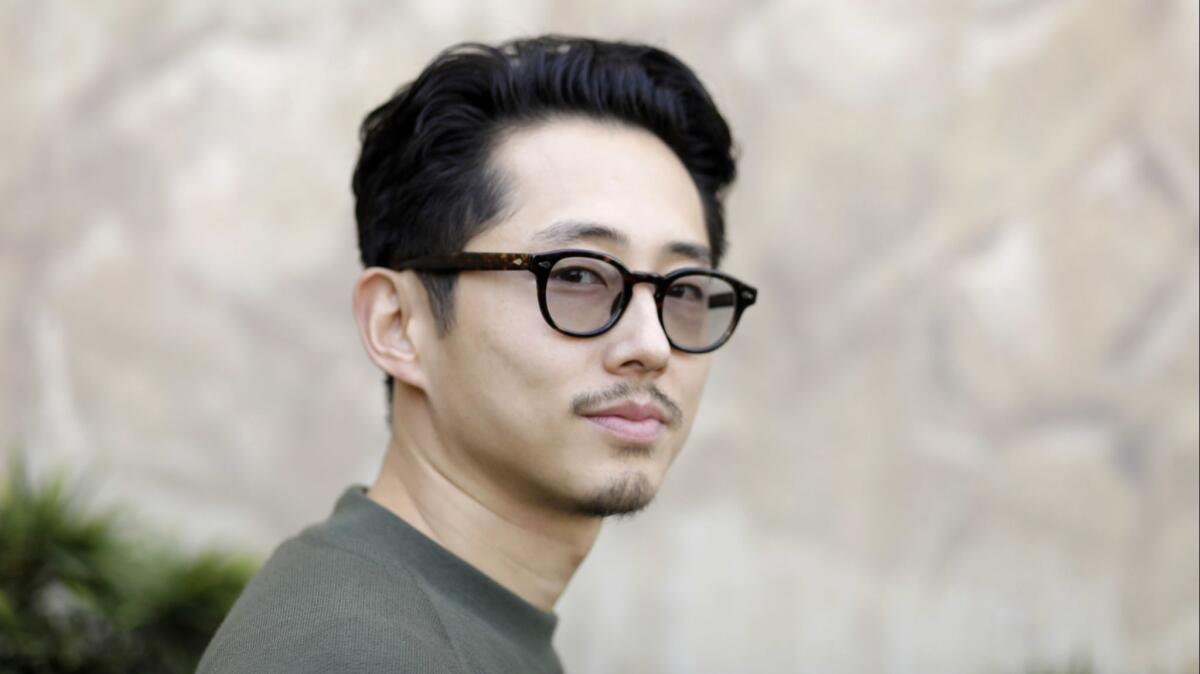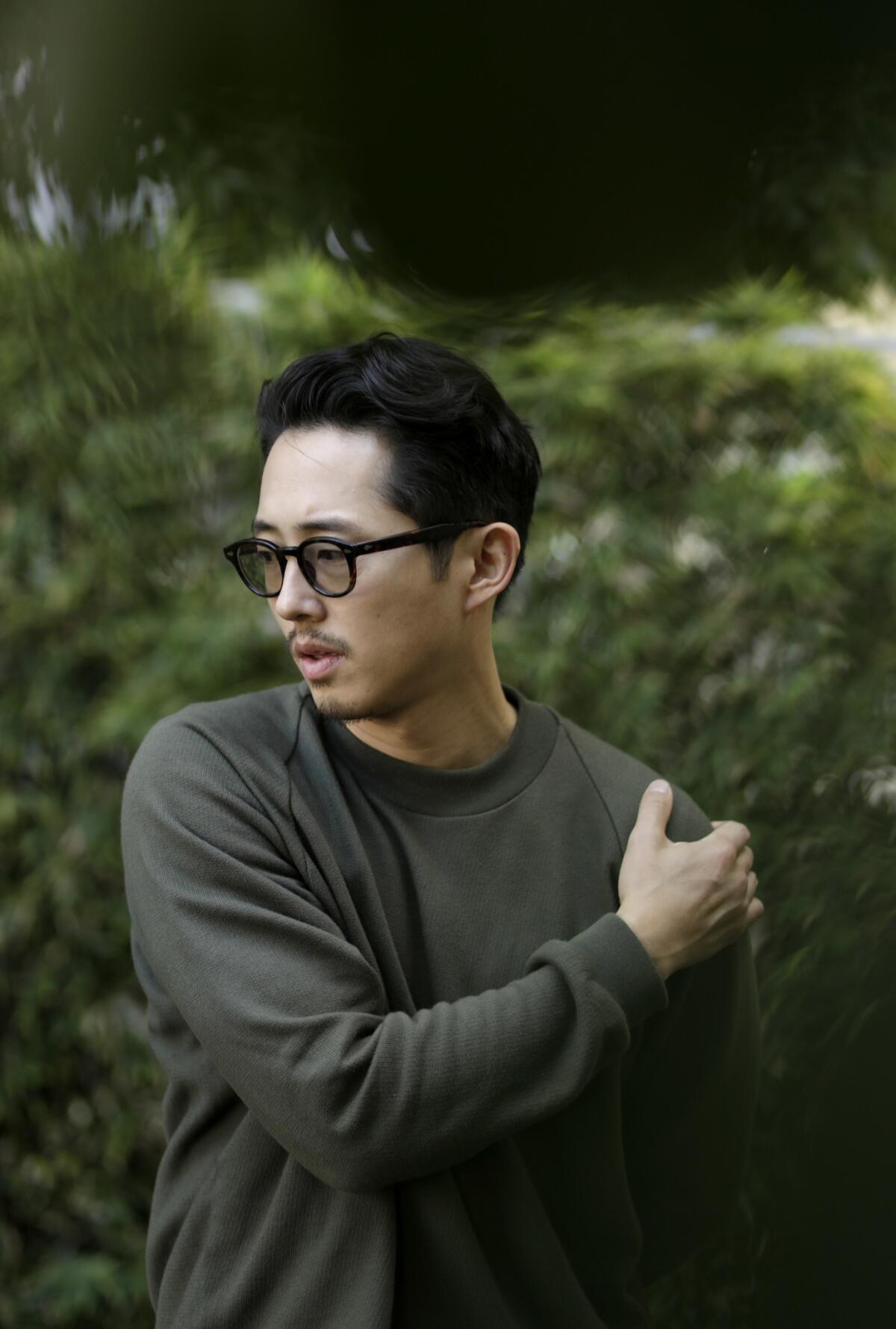Two years after ‘The Walking Dead,’ Steven Yeun’s film career is ‘Burning’

- Share via
Steven Yeun is a master at playing nice.
But after six years portraying moral compass and emergent leader Glenn Rhee on AMC’s long-running “The Walking Dead,” the 34-year-old actor has embraced the opportunity to do something different.
“It’s cool to be able to graduate from a show and experience such as ‘The Walking Dead’ and be able to constantly stretch myself and put myself to the test,” he said. “I just hope I can continue to do that.”
Yeun has found one of his meatiest roles to date with “Burning,” Lee Chang-dong’s haunting mystery drama and South Korea’s official Oscar entry for foreign language film. He plays Ben, a handsome and wealthy Gatsby-type whose ceaseless pursuit of fun indicates a pervasive and gnawing ennui.
Times critic Justin Chang calls the film, which is now playing in limited release and expanding to additional theaters Friday, “a romantic triangle, a crime thriller, a dark comedy of class rage [and] a parable for a divided nation.”
“My character, he has a sense of emptiness about him, a sense of loneliness,” said Yeun. “Regardless of whether he has all the things that he needs in this material life, he’s clearly — or maybe not clearly — missing something.”
Ben seeks diversion in Hae-mi (Jeon Jong-seo), an emotive firebrand whose dramatic highs and lows serve as a counterpoint to his calm remove. But he seems to get the biggest kick out of his encounters with Jong-su (Yoo Ah-in), a farm boy and Hae-mi’s would-be paramour, the perfect foil to Ben’s polished wealth.
“There’s a really fun connection to be made about what each character is burning for in their own right, what they’re waiting for,” said Yeun. “Hae-mi has been waiting for Ben, Ben has been waiting for Jong-su, and Jong-su has been waiting for Hae-mi. Something to make them feel again. Maybe he’s been waiting for someone like [Jong-su] his whole life.”
The disappearance of one of the three in the third act leads to the collapse of their precarious triangle. Several clues are uncovered to imply Ben’s potential involvement, though the film offers no clear answers. And neither does Yeun.
“Director Lee was like, ‘You’ll be the only person that knows, and you will make that decision for yourself,’ ” he said. “And then he asked me at the end of the shoot which one I chose. I told him that I wasn’t going to tell him either. So I’m the only one that knows.”

REVIEW: Lee Chang-dong’s ‘Burning’ is a mesmerizing drama of rage, confusion and thwarted desire »
Lee was inspired to adapt “Burning,” which is based on Haruki Murakami’s 1983 short story “Barn Burning,” because of the story’s open-endedness.
“When I first read Murakami’s short story, what interested me was the fact that, unlike other typical thrillers, there’s no real resolution,” he said. “So I thought that this openness could then be expanded into other and bigger mysteries.”
Rather than barns, which are in short supply in Korea, the film substitutes the country’s ample greenhouses to explore themes of destruction and insouciance.
“Ben says there’s a lot of dirty greenhouses everywhere and they make everything look disgusting, might as well get rid of them,” said Yeun. “As if he’s some agent of nature to do that. And so it can imply an idea, it can be literal. There’s a lot of layers there, I think.”
Despite being fluent in Korean, speaking the language convincingly was a challenge for the actor, who grew up in Michigan (he was born in Seoul). Being conscious of the nuances and intonations of native speakers was tricky, he said, but that sense of difference was ultimately absorbed into the fabric of Ben.
“I think that’s a part of the reason why director Lee cast me,” said Yeun. “Ben isn’t American, but we didn’t try to suppress my inherent Americanness in my body. Rather, we let it color the ambiguity of this person who, for all intents and purposes, looks, speaks and acts Korean. But then there’s a weird energy about him where it doesn’t seem right.”
Beyond lending a sense of the other, Lee said the range Yeun exhibited in the action-adventure “Okja” and on “The Walking Dead” also contributed to his decision to cast him.
“In ‘Okja,’ he plays a character that is very bright and expressive, which is quite different from his character in ‘Burning,’ ” the director said. “This difference was very interesting because Ben could be a very scary serial killer or he could be a very kind, gentle and wealthy friend. This mysterious duality is a very important character trait of Ben’s and the fact that Steven could portray both sides of this was impressive.”
Yeun’s portrayal of Ben, equal parts charming and sinister, is searing. In many ways the character’s menace is rooted in his ambiguity.
“I think that’s where a lot of the mystique comes from,” said Yeun. “Not that you can say, ‘Hey, this guy’s creepy because he’s evil,’ I actually think Ben’s creepy because you’re just like, ‘What are you? Who are you?’ So I played with that dissonance.
“It was easy to find moments where I could hang on to the evil interpretation of the character,” he added. “But then it became more interesting, in my opinion, to stray away from that aspect of him and really just deep-dive into being a present, lonely person.”
To embody that sense of loneliness, Yeun forced himself into Ben’s shoes, despite the ensuing discomfort.
“The character really started to click for me when I truly could see the world in the same way that he saw it,” he said. “Which was fun and not fun at the same time.
“In some ways, someone who can be brave in the face of chaos, in the face of examining and accepting that the world is, in his eyes, meaningless, and still be able to get up every day is freakier [than pure evil],” he said. “You don’t understand that person .”
To get into the mind of an emotionally vacant person, he read works like Martin McDonagh’s “The Pillowman” and Albert Camus’ “The Stranger.” Books by Nietzsche and zen-focused, Buddhist philosophies also lent color to the character, but it wasn’t until the LA-based actor arrived in South Korea that Ben’s pathos really began to take shape.
“The character really started to open up to me when I was put in to interact with the actors,” he said. “That and also this pervasive sense of loneliness that I myself went through just being there.”
During production he stayed at the Grand Hyatt in Itaewon, a Westernized hotel situated by Mount Namsan (“You can have a very Glass Tower experience from that place”) and made the deliberate choice to isolate himself from everyone, opting to walk the streets and eat alone. “Over time I was like, ‘I’m lonely,’” he recalled. “But then what was really wonderful and refreshing was that I had a direct thing to put that into.”
RELATED: Director Lee Chang-dong and actor Steven Yeun on the profound mysteries of ‘Burning’ »
Yeun got his start acting while at Michigan’s Kalamazoo College.
Early on in his career, he scored the role of a lifetime as Glenn, one of the few principal characters in the first season of “The Walking Dead.” And on a show that kills off characters with alarming regularity, he continued for six seasons.
“I was so green and just kind of learning the ropes,” said Yeun of his time on the AMC series. “There, I felt like that was me just being physical. Really honing my skill and relying on my body to get me to a lot of places.”
Despite the popularity of his character (who met his demise in the epic season seven premiere), Yeun admits he doesn’t miss the pace of television. “I have in hindsight realized that these experiences sometimes get to be pretty intense and all-consuming,” he said. “It’s really nice to be able to start a character and then finish. I don’t know if I have the skill yet of being able to hang my hat at the door as well as I should be able to.”
Over the course of six years on the top-rated series, Yeun’s star began to rise. He scored the lead role in the horror indie “Mayhem” and a supporting role in “Okja.” Most memorably, he played union organizer Squeeze in Boots Riley’s sci-fi comedy “Sorry To Bother You” opposite Lakeith Stanfield and Tessa Thompson.
“Acting has been a really wonderful vehicle of being able to explore my own innate humanness and my own personality,” he said. “When you embody another being you get that real type of empathy that only stretches you and makes you larger and deeper. That’s what continues to draw me.”
As for how he’d want his career to unfold, Yeun says he knows better than to tell the universe his plans.
“Much like ‘Burning,’ you will never know,” he said. “We pull out a plan and that’s great and all, but it never goes that way. So these days I’ve just been following my gut to where projects lead. It’s not me making choices per se, it’s more like, ‘Here’s a bunch of not great projects and then here’s the one that’s good, so I’m going to do that one that’s good.’”
“Maybe I want to be more human in my roles, maybe I want to normalize me to this society, to myself, I don’t know. Those seem like the right moves, but who knows? I’m just kind of going with it these days.”

“The Walking Dead” grad Steven Yeun and director Lee Chang-dong talk about why it was important to film “Burning” in Korea and how it changed Yeun’s approach to the part.
follow me on twitter @sonaiyak
More to Read
Only good movies
Get the Indie Focus newsletter, Mark Olsen's weekly guide to the world of cinema.
You may occasionally receive promotional content from the Los Angeles Times.











